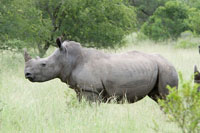






The initiative is one of numerous steps being taken to rid the sector of illegitimate and ill-intended operations and ensure greater legitimacy of organisations and individuals involved in projects aimed at addressing the scourge of rhino poaching in South Africa.
In light of the serious concern by government and members of the public about the increase in rhino poaching, a common goal is being shared by the South African government, private rhino owners, non-profit organisations, non-governmental organisations, stakeholders and the public at large: to reduce the illegal killing of rhino and secure and grow rhino populations.
Under the present system, NGOs and NPOs are required to register with government through the Department of Social Development. The failure of organisations or individuals to submit annual audited reports results in the de-registration of such bodies from the Social Development database, but some continue operating despite de-registration.
The registration of NPOs, NGOs, organisations and/or individuals involved in rhino anti-poaching projects with the Department of Environmental Affairs will improve monitoring of compliance with the Companies and Intellectual Property Commission (CIPC) and ensure that their financial records are up-to-date.
The aim of the registration process is to:
In an effort to coordinate the financing of anti-poaching initiatives, the department is planning to establish a National Rhino Fund in consultation with the National Treasury. The fund will address all interventions directed to rhino poaching.
The National Rhino Fund will result in the consolidation of all funding requirements and ensure that funding is distributed successfully to state- and privately-owned rhino anti-poaching initiatives, including conservation, safety and security, skills development and research.
| Rhino poaching statistics | ||||
|---|---|---|---|---|
| SA | 2010 | 2011 | 2012 | 2013 |
| KNP (SANParks) | 146 | 252 | 425 | 396 |
| MNP (SANParks) | 0 | 6 | 3 | 2 |
| GP | 15 | 9 | 1 | 3 |
| LIM | 52 | 74 | 59 | 64 |
| MP | 17 | 31 | 28 | 43 |
| NW | 57 | 21 | 77 | 62 |
| EC | 4 | 11 | 7 | 2 |
| FS | 3 | 4 | 0 | 0 |
| KZN | 38 | 34 | 66 | 63 |
| WC | 0 | 6 | 2 | 0 |
| NC | 1 | 0 | 0 | 0 |
| 333 | 448 | 668 | 635 |
| Rhino poaching arrests statistics | ||||
|---|---|---|---|---|
| South Africa - Arrests | 2013 | 2012 | 2011 | 2010 |
| KNP | 75 | 73 | 82 | 67 |
| MNP | 0 | 0 | 0 | 0 |
| Gauteng (GP) | 3 | 26 | 16 | 10 |
| Mpumalanga (MP) | 19 | 66 | 73 | 16 |
| Eastern Cape (EC) | 0 | 0 | 2 | 7 |
| Limpopo (LP) | 40 | 43 | 34 | 36 |
| North West (NW) | 18 | 32 | 21 | 2 |
| Free State (FS) | 0 | 6 | 0 | 0 |
| KwaZulu-Natal (KZN) | 39 | 20 | 4 | 25 |
| Western Cape (WC) | 0 | 0 | 0 | 2 |
| Northern Cape (NC) | 0 | 1 | 0 | 0 |
| Total | 194 | 267 | 232 | 165 |
South Africans are encouraged to report incidents of poaching and tip-offs to the anonymous tip-off lines 0800205005, 0860010111 or Crime-Line on 32211.